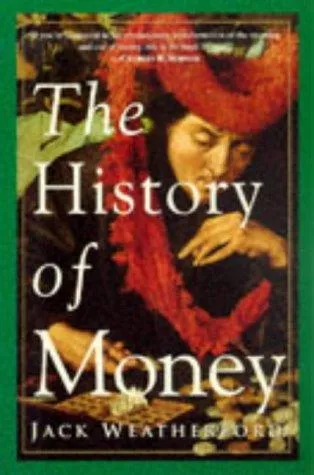
This list is curated from 1 mentions and sorted by most mentioned, then by date of most recent mention. The more a book is mentioned, the more likely it's recommended and a favorite!

This list is curated from 1 mentions and sorted by most mentioned, then by date of most recent mention. The more a book is mentioned, the more likely it's recommended and a favorite!
This book is a relatively short whirlwind tour of some aspects of the history of money, presented chronologically from antiquity to approx. 1997, when this book was published. Basically, due to a number of properties of asset creation in society (e.g. role of skill/expertise, need for up-front investment in production, batch efficiencies, etc.) various assets regularly end up in surplus or scarcity for any one person or organization, leading to a need for some system of exchange. Money fills this need and becomes the scalar signal that communicates scarcity across society in an emergent, decentralized manner. The book goes over multiple forms of money that have existed over the course of history stopping by different places of spacetime in each chapter. It touches on gift economy and debt in small societies in presence of trust, barter in cases of lack of trust, early commodity money that typically has intrinsic value and is a convenient means of exchange (e.g. cacao seeds used in the Aztec empire to "top off" an uneven barter, cigarettes, manufactured items (furs), coins (gold/silver), animals (cattle), or even people (slaves)), early representative money (checks, notes, receipts, or even paper money as long as it was backed by gold), fiat money ("worthless" paper not backed by anything tangible), and electronic money where we transition the whole system from atoms to bits. Not covered are cryptocurrencies as since these were not around in 1997 (eg bitcoin, which on top of all that innovation is also not governed by any central authority and is secured cryptography due the computational hardness of some inverse operations in our Universe). I enjoyed the discussion of various societies and their relationship to money as it evolved. E.g. Sparta/Egypt/Persians and other traditional empires largely rejected money in favor of government as the organizing principle, while other empires (Greeks, Romans, etc) quickly embraced it. Plato/Aristotle both had odd views on it. The Aztecs and others regulated it and its exchange tightly. Merchants were not historically part of high stratums of society, and the pursuit of money was not pervasive or even looked up to. This is fun to contemplate against the backdrop of our capitalist way of life. I also didn't realize, until reading this book, just how common and pervasive it was for governments to tamper with the money supply and monetary policy over the ages, often to no good outcomes in the long term. Eg Nero in Ancient Rome minted coins with progressively less silver as he struggled to fund the bloating Roman government beurocracy. Various other governments over the years printed a ton of money causing massive inflation and crumbling the entire economic system. On the unintended side of things, it was interesting to read about the discovery of the New World and the California gold rush in mid 1800, which both flooded the market with gold, again causing some havoc. Anyway, I think the book can be a little too hasty in glossing over some developments and leans more heavily on description instead of explanation, but overall covers a large portion of interesting historical aspects of money and its place in a number of ancient and recent societies. I would think of it more as a series of pointers and anecdotes instead of a definitive first principles guide. 3/5View source